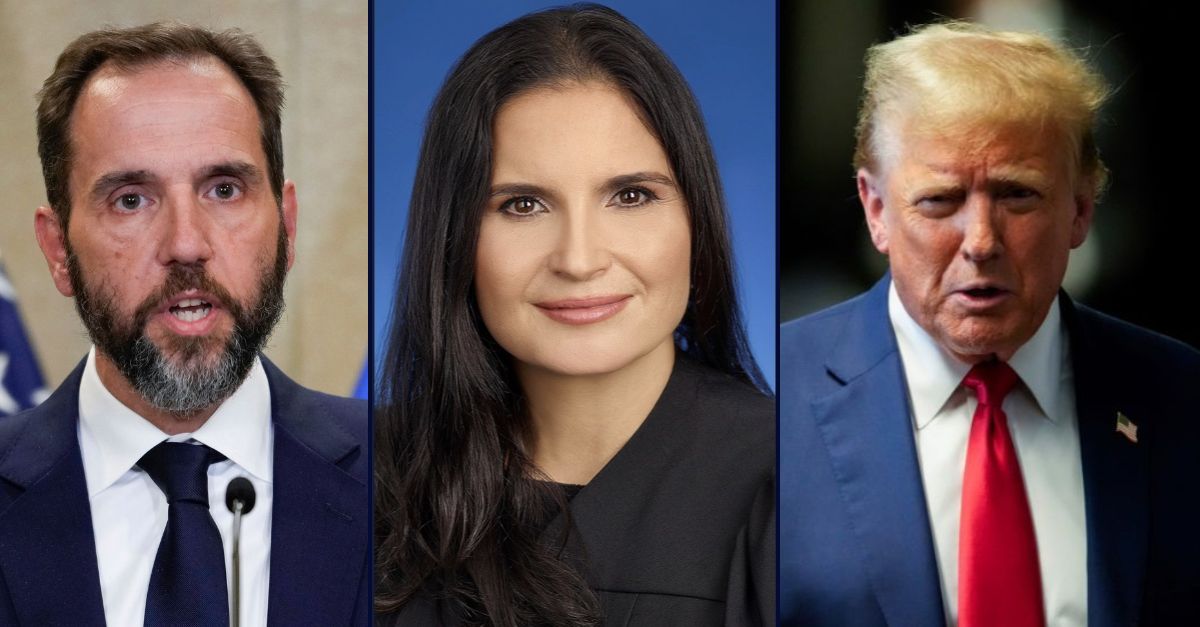
Left: FILE – Special counsel Jack Smith speaks to the media about an indictment of former President Donald Trump, Aug. 1, 2023, at an office of the Department of Justice in Washington (AP Photo/J. Scott Applewhite, File). Center: U.S. District Judge Aileen Cannon (U.S. District Court for the Southern District of Florida). Right: Donald Trump speaks to members of the media before departing Manhattan criminal court, Monday, May 6, 2024, in New York (AP Photo/Julia Nikhinson, Pool).
The U.S. Department of Justice over the weekend continued to push for the release of former special counsel Jack Smith’s two-volume final report into the federal criminal investigations into Donald Trump. The department has been pressing for the release of the report since U.S. District Judge Aileen Cannon last week issued an order temporarily enjoining Attorney General Merrick Garland from putting out either volume of the report.
Smith formally resigned as special counsel on Friday after submitting his report to Garland.
The DOJ is seeking the public release of the first volume of the report, which deals with Trump’s alleged efforts to subvert the 2020 presidential election, and the release of the second volume, which deals with Trump’s alleged mishandling of classified documents, to select members of Congress due to ongoing criminal cases against two of Trump’ associates.
Cannon, a Trump appointee who has been repeatedly praised by the president-elect, controversially dismissed the classified documents case, reasoning that Smith’s appointment as special counsel was unlawful. While dropping the cases against Trump due to long-standing policy against prosecuting a sitting president, the DOJ has appealed Cannon’s ruling regarding the remaining cases against his codefendants.
Cannon’s temporary injunction is scheduled to expire at midnight on Monday.
Trump’s co-defendants in the classified documents case, Walt Nauta and Carlos De Oliveira, over the weekend implored Cannon, the presiding judge in their criminal case, to extend the order blocking both volumes of the report, arguing the release of the first volume would unconstitutionally prejudice their due process rights.
On Sunday, the DOJ filed a two-page supplement restating its position that the public release of the first volume would have no impact on the cases before Cannon, claiming that nothing in that part of the report “directly or indirectly refers, relies, or bears in any respect upon any evidence or argument relevant to any of the charges alleged against Defendants Nauta and De Oliveira in this case.”
The DOJ noted that the first volume makes two references to the classified documents case — neither of which mention Nauta or De Oliveira, their alleged conduct, or the charges against them — which would be provided in a sealed filing.
The government also reiterated its belief that Cannon lacks the authority to stop the attorney general from releasing both volumes of the report as initially intended.
“[T]he district court had no proper basis for preventing the Attorney General from making Volume Two available for in camera review by the Chairmen and Ranking Members of the House and Senate Judiciary Committees, pursuant to restrictions to protect confidentiality and subject to redactions to protect information protected by Rule 6(e) and court orders,” the DOJ wrote in court filings last week seeking to reverse Cannon’s order. “And the district court had no basis at all for enjoining the public release of Volume One, which relates to a prosecution that does not concern defendants and which, in any event, defendants have identified no plausible merits theory for enjoining.”
Nauta and De Oliveira on Sunday filed a 12-page reply seeking to keep Cannon’s order in place, arguing that the government was motivated by politics ahead of Trump taking office.
“The Government, driven by political priorities that have no place in a criminal trial setting, seeks to strong-arm its way through this orderly process and has repeatedly failed to abide by established rules and procedure,” the filing states. “Political preference must yield to due process of law.”
The duo also argued that the DOJ’s proposed actions would serve to trample on their constitutional rights.
“Defendants offer several cognizable bases to restrict the Attorney General’s discretion in this case-related dissemination matter,” the filings states. “The most significant of them is that Defendants’ constitutional right to a fair trial justifies restricting any exercise of discretion by the Executive Branch that will infringe on those fair trial rights. An extension of the stay is warranted here pending resolution of the protective order enforcement sought here.”
The DOJ has sought to consolidate its appeal of Cannon injunction with its appeal of her order dismissing the classified documents case as a whole, thereby giving the appellate panel authority to rule on both.
Cannon has yet to issue a ruling on extending the temporary injunction.








